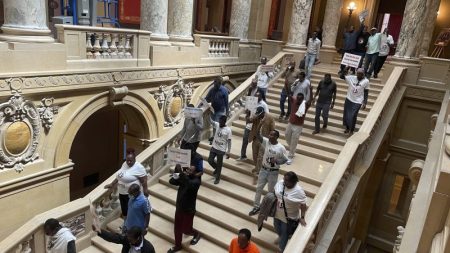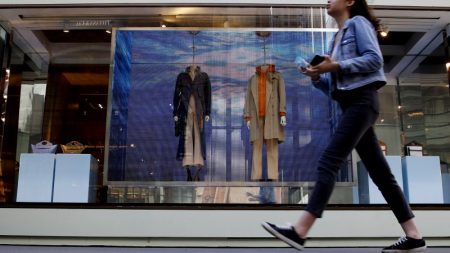Nathan Frederiksen, a 40-year-old manager of financial analysts in Boise, Idaho, is on track to retire by 60 despite making a solidly middle-class income. He is able to save 10% of his income for retirement, support his wife and four children, and maintain an emergency savings fund through frugal living. While he feels good about his personal finances, he believes the larger economy is struggling due to inflation and rising expenses. This sentiment is echoed in a recent Wall Street Journal poll of American voters in swing states, where people believe it is becoming harder for the average person to get ahead but feel positive about their own financial situation.
Despite the perception of a struggling economy, available data shows improvement. Since President Joe Biden took office, the unemployment rate has decreased, inflation has lowered, and the US gross domestic product has grown. Financial markets have also performed well. This disconnect between economic sentiment and data has become a common theme in the United States. Ben Harris, the director of the Economic Studies program at Brookings, suggests that where people get their information plays a significant role in shaping their views on the economy, with social media and biased news sources often providing misleading information.
Jonathon Barricklow, a director at an automotive company in Ohio, discovered that inflation rates were not as high as he had anticipated when he volunteered at a concession stand and compared prices. His personal analysis showed that his grocery bills had remained stable, despite the belief that inflation was affecting costs. It is important to look at consumer behavior, rather than just sentiment, to understand how Americans truly perceive the economy. Harris notes that consumer spending, job quitting rates, and stock market investments indicate overall positive economic sentiment among Americans.
Many Americans, especially near-retirees, are still haunted by the effects of the 2008 financial crisis and the uncertainties brought on by the pandemic, geopolitical conflicts, and election-year jitters. Financial anxiety is prevalent, as people anticipate potential economic turmoil. Megan McCoy, a professor of financial therapy at Kansas State University, explains that chronic uncertainty can lead to heightened anxiety and difficulty managing day-to-day stressors. Julie Levitch, a single mom in Arizona, worked hard to secure her financial future after experiencing financial devastation during the 2008 recession. Despite her success, she still worries about job security and sees others struggling financially around her.
While some Americans, like Levitch, have managed to secure their financial future through smart financial decisions, others continue to face economic challenges. The perception of wealth disparity and financial elitism can further exacerbate feelings of financial insecurity among those who are struggling. However, data shows that wealth gains and wage growth have been seen across income distributions, indicating a decline in inequality. Middle-class Americans experiencing financial success may feel guilt, but Harris suggests that overall, there has been a positive trend in wealth distribution. Ultimately, the disconnect between how people feel about their own finances and the economy at large highlights the complexities of economic perceptions in the United States.















